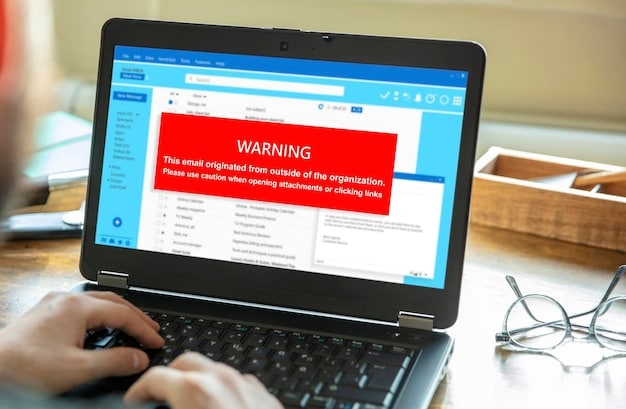Stay Safe Online: US Travel Scams – Prevention Tips

Increased scams targeting US travelers online necessitate heightened awareness and proactive measures, including secure Wi-Fi usage, two-factor authentication, and verifying website legitimacy, to safeguard personal and financial information while traveling.
Traveling within the US should be an exciting experience, but the rising instances of online scams targeting travelers are a cause for concern. This article sheds light on the alert: increased scams targeting US travelers – how to stay safe online, arming you with essential tips to safeguard your digital life during your adventures.
Understanding the Landscape of Online Travel Scams
The digital age has transformed travel, making planning easier than ever. However, it has also opened doors for scammers who exploit vulnerabilities in online booking processes and communication channels to target unsuspecting US travelers. Understanding the common types of scams is the first step in protecting yourself.
Phishing Emails and Fake Websites
One of the most prevalent tactics is phishing. Scammers send emails that appear to be from legitimate travel companies, such as airlines, hotels, or booking platforms. These emails often contain links to fake websites designed to steal your personal and financial information.

Fake websites mimic the look and feel of legitimate ones, making it difficult to distinguish them from the real deal. They may offer unbelievably low prices or claim urgent deals to pressure you into making a hasty decision.
- Always check the sender’s email address carefully. Look for misspellings or unusual domain names.
- Hover over links before clicking to see where they lead. If the URL doesn’t match the supposed destination, don’t click.
- Verify the website’s security certificate by looking for the padlock icon in the address bar.
Wi-Fi Hacking
Public Wi-Fi networks in airports, hotels, and cafes are convenient, but they are also prime targets for hackers. Unsecured networks can allow scammers to intercept your data, including usernames, passwords, and credit card numbers.
Hackers can also create fake Wi-Fi hotspots that look legitimate. When you connect to these hotspots, they can monitor your online activity and steal your information.
- Avoid conducting sensitive transactions, such as online banking or shopping, on public Wi-Fi networks.
- Use a Virtual Private Network (VPN) to encrypt your internet traffic and protect your data.
- Confirm the name of the legitimate Wi-Fi network with the establishment.
By understanding the common tactics used by online scammers, you can be more vigilant and take steps to protect yourself while traveling.
Protecting Your Devices and Data
Before embarking on your US travels, it’s crucial to ensure your devices and data are secure. Securing your devices and employing robust security measures can significantly reduce the risks associated with online scams.
Updating Software and Applications
Software updates often include security patches that fix vulnerabilities that scammers can exploit. Keeping your operating system, web browser, and apps up to date is a simple yet effective way to protect your devices.
Enable automatic updates whenever possible to ensure you always have the latest security features. Regularly check for updates manually as well, especially before a trip.
Using Strong Passwords and Two-Factor Authentication
Strong, unique passwords are your first line of defense against unauthorized access. Avoid using easily guessable passwords like “password123” or your birthdate. Instead, opt for a combination of uppercase and lowercase letters, numbers, and symbols.
Two-factor authentication (2FA) adds an extra layer of security by requiring a second verification method, such as a code sent to your phone, in addition to your password.

- Use a password manager to generate and store strong passwords securely.
- Enable 2FA on all accounts that offer it, including email, social media, and banking.
- Be wary of password reset requests you didn’t initiate, as they could be phishing attempts.
Regularly scanning your devices, maintaining updated software, and employing strong authentication methods are crucial steps in fortifying your online security while traveling.
Staying Safe on Public Wi-Fi
Public Wi-Fi networks are a convenient way to stay connected while traveling, but they also pose significant security risks. By taking extra precautions when using these networks, you can minimize your exposure to potential scams and hacks.
Using a VPN
A Virtual Private Network (VPN) encrypts your internet traffic, making it unreadable to anyone who might be snooping on the network. This provides a secure tunnel for your data, protecting your sensitive information from interception.
Many reputable VPN providers offer affordable subscriptions. Install and activate a VPN on your devices before connecting to public Wi-Fi networks.
Avoiding Sensitive Transactions on Public Wi-Fi
Avoid conducting sensitive transactions, such as online banking, shopping, or entering credit card information, on public Wi-Fi networks. These activities can expose your financial details to potential scammers.
If you must perform these transactions, use your mobile data connection or a trusted Wi-Fi network instead.
- Look for “https” in the website address, which indicates a secure connection.
- Avoid entering personal information on websites that don’t use encryption.
Using a VPN and being mindful of the types of activities you perform on public Wi-Fi are essential steps in protecting your online security.
Recognizing and Avoiding Common Travel Scams
Being able to identify common travel scams can help you avoid falling victim to them. Knowing what to look for and how to respond can save you from financial losses and identity theft.
Fake Booking Websites and Deals
Scammers often create fake booking websites that mimic legitimate travel companies. These websites may offer incredibly low prices to lure you in, but they are designed to steal your money and personal information.
Always book directly through the official website of the airline, hotel, or rental car company. If you choose to use a third-party booking platform, make sure it is reputable and secure.
- Check online reviews and ratings of the booking platform before using it.
- Look for the padlock icon in the address bar to ensure the website is secure.
- Be wary of deals that seem too good to be true, as they often are.
Accommodation Scams
Accommodation scams can take various forms, such as fake rental listings or fraudulent hotel reservations. Scammers may ask for upfront payments or deposits for properties that don’t exist or are not as advertised.
Use reputable booking platforms with secure payment systems. Verify the property’s legitimacy by checking online reviews and contacting the property owner or manager directly.
Inspecting photos of properties and comparing prices should be the minimum effort before confirming the accommodation.
- Never send money via wire transfer or other methods that are difficult to trace.
- Be cautious of listings with limited information or vague descriptions.
Staying informed about common travel scams and exercising caution when booking travel services can help you avoid becoming a victim.
What to Do If You’ve Been Scammed
Despite your best efforts, you may still fall victim to an online scam. Knowing what steps to take in such a situation can help you minimize the damage and prevent further harm.
Reporting the Scam
Report the scam to the appropriate authorities, such as the Federal Trade Commission (FTC) or your local law enforcement agency. Provide as much information as possible, including the details of the scam, the scammer’s contact information, and any financial losses you have incurred.
Reporting the scam can help authorities track down the scammers and prevent them from targeting others.
Contacting Your Bank and Credit Card Company
If you have provided your financial information to a scammer, contact your bank and credit card company immediately. Request them to freeze your accounts and cancel any unauthorized transactions.
Monitor your accounts closely for any suspicious activity and report it to your bank or credit card company.
- Change your passwords for all your online accounts, especially those associated with your financial information.
- Consider placing a fraud alert on your credit report to prevent identity theft.
Swiftly reporting the scam and taking action to protect your financial accounts can mitigate the potential damage.
Staying Informed and Vigilant
The online threat landscape is constantly evolving, with scammers developing new and sophisticated tactics. Staying informed about the latest scams and security threats is essential for protecting yourself while traveling. This vigilance will keep you safe during your travels.
Following Security News
Follow reputable security news sources and blogs to stay up to date on the latest online scams and security threats. These sources often provide valuable tips and advice on how to protect yourself.
Subscribe to email newsletters or follow social media accounts of security experts and organizations.
Sharing Information with Others
Share information about online scams with your friends, family, and fellow travelers. By raising awareness, you can help prevent others from falling victim to these scams.
Post about scams on social media or share articles and resources with your network.
- Discuss your experiences with others to learn from each other.
- Report any suspicious activity you encounter to help protect the community.
Remaining informed, vigilant, and proactive in sharing information will contribute to a safer online environment for all travelers.
| Key Point | Brief Description |
|---|---|
| 🛡️ Use a VPN | Encrypt your internet traffic on public Wi-Fi to protect your data from hackers. |
| 🔍 Verify Websites | Always check the URL and security certificate (padlock icon) before entering personal info. |
| 🔒 Strong Passwords | Use unique, complex passwords and two-factor authentication for added security. |
| 🚨 Report Scams | If scammed, report it to FTC and your bank to minimize financial damage. |
FAQ
Immediately cease all communication with the suspected scammer. Do not provide any further personal or financial information and document all interactions for reporting.
Compare prices from multiple sources. If a deal significantly undercuts the average, it’s likely a scam. Also, verify the legitimacy of the provider’s website.
No, it is not recommended. Public Wi-Fi lacks security. Use a VPN or mobile data for sensitive transactions. Always ensure the connection is secure and encrypted.
Contact your bank immediately to freeze your accounts. Change all your passwords and file a report with the FTC. Monitor your credit reports for any unauthorized activity.
2FA adds an extra security layer by requiring a second verification method, protecting your accounts even if your password is compromised, especially crucial in unfamiliar environments.
Conclusion
In conclusion, staying safe from the alert: increased scams targeting US travelers – how to stay safe online requires a combination of awareness, proactive security measures, and vigilance. By understanding the common tactics used by scammers, securing your devices, and staying informed about the latest scams, you can protect yourself from financial losses and identity theft while enjoying your travels within the US. Remember, a little caution can go a long way in ensuring a safe and enjoyable travel experience.





